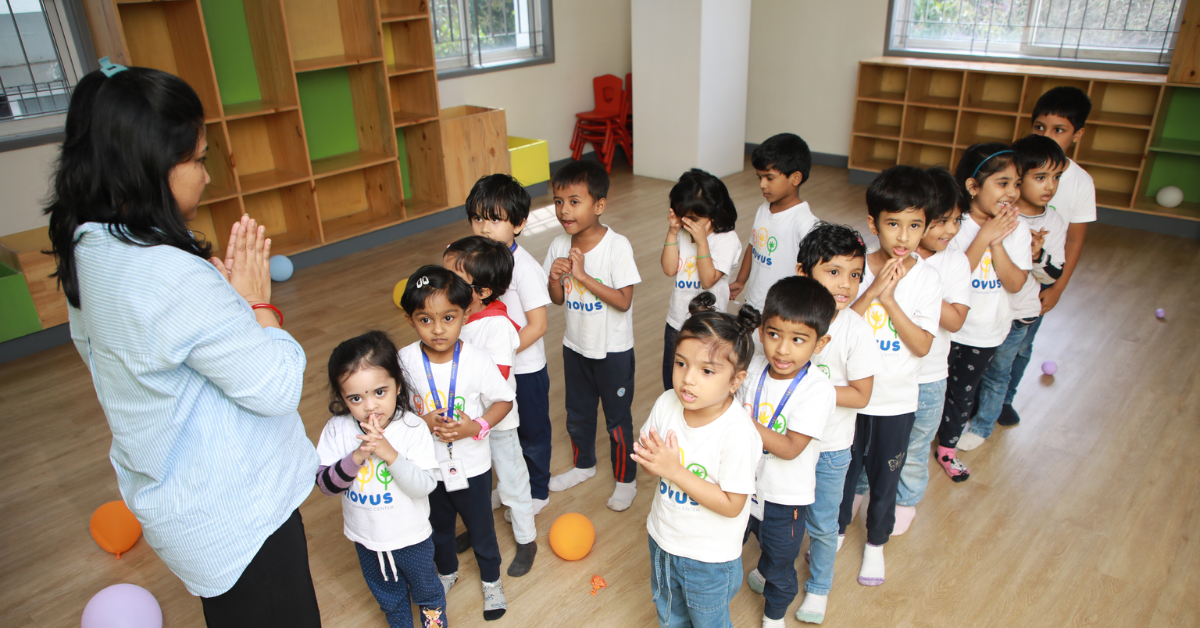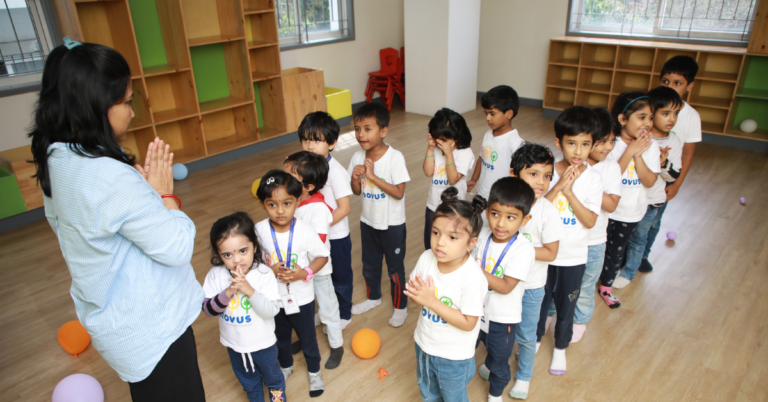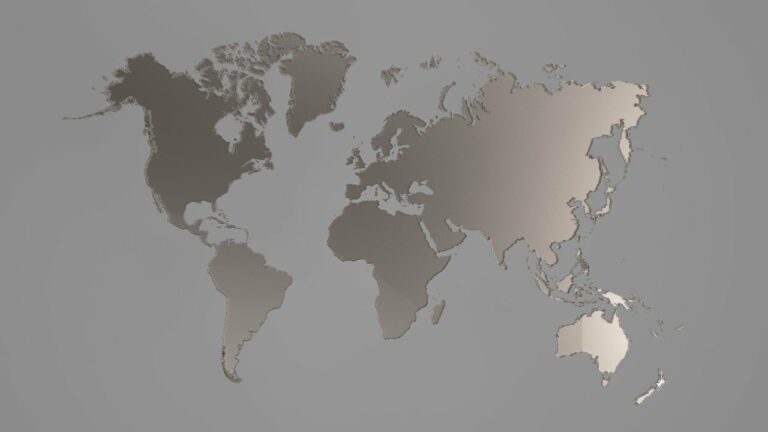Early Childhood Education: Building the Foundation for Lifelong Learning
The early years of a child’s life are filled with rapid growth, boundless curiosity, and endless potential. During this period, the experiences a child receives can shape how they think, feel, interact, and learn throughout their life. Early Childhood Education is not just a preparation for school—it’s the most critical investment in a child’s long-term development. At Novus Early Learning Centre in Yelahanka, we believe in nurturing this vital stage through care, creativity, and curriculum designed specifically for young minds. In this article, we explore the importance, benefits, and components of high-quality early childhood education and how Novus supports this transformative phase.
What Is Early Childhood Education?
Early childhood education refers to the formal and informal learning that takes place from birth to around eight years of age. This includes programs such as play groups, nursery, pre-primary, and early grades of primary school. It is a structured approach to developing essential skills through play, interaction, exploration, and guided learning. The goal is to support physical, emotional, social, and cognitive development in a way that prepares children not just for school but for life. A well-rounded early childhood program focuses on developing language skills, motor coordination, self-regulation, empathy, and creativity—all while making learning a joyful experience.
Why Early Childhood Education Matters
Research in neuroscience and developmental psychology consistently shows that early childhood is the most sensitive period for brain development. During these formative years, more than one million neural connections are formed every second. These connections are influenced by a child’s environment, relationships, and experiences. High-quality early education during this phase improves academic outcomes, boosts emotional intelligence, and builds resilience. Children exposed to early learning are more likely to succeed in school, have better social skills, and face fewer behavioral issues. In the long term, early education contributes to higher graduation rates, better career prospects, and even improved health outcomes.
Core Areas of Early Childhood Development
Cognitive Development
Cognitive development includes memory, problem-solving, reasoning, and language. Through structured activities, story sessions, puzzles, and interactive games, children begin to understand basic concepts, develop focus, and think creatively. Early education nurtures curiosity and encourages independent exploration, which leads to stronger thinking skills.
Physical Development
Gross motor skills like running, jumping, and climbing, as well as fine motor skills like drawing, buttoning, and stacking, are developed through daily play and practical tasks. A good early education program ensures that children engage in movement-based learning, outdoor activities, and hands-on work that improves coordination and physical confidence.
Social and Emotional Development
One of the most important aspects of early education is helping children learn how to express emotions, manage stress, share, cooperate, and build friendships. Group activities, free play, and conflict resolution exercises help children learn empathy, self-awareness, and emotional regulation—skills essential for healthy relationships and future teamwork.
Language and Communication
Children are natural communicators, and early education strengthens their vocabulary, listening, and speaking skills. Exposure to songs, storytelling, interactive reading, and guided conversations builds a strong language foundation. This, in turn, supports reading readiness and academic success in later years.
What Makes an Effective Early Childhood Education Program?
Choosing the right early learning environment can have a lifelong impact. High-quality programs share common characteristics that create safe, stimulating, and supportive conditions for development.
Qualified Educators
Early childhood educators must have specialized training in child development, classroom management, and curriculum design. They should be warm, attentive, and capable of creating individualized learning paths. A low student-teacher ratio is also critical to ensure that every child receives personal attention.
Play-Based Curriculum
The best learning happens through play. A well-designed curriculum uses play as a tool for discovery, skill development, and confidence-building. Activities should be age-appropriate and cover areas such as art, music, nature exploration, early science, math concepts, and creative expression.
Safe and Stimulating Environment
Young children thrive in spaces that are clean, colorful, secure, and sensory-rich. Classrooms must be designed to allow movement, choice, and interaction. Outdoor areas, reading zones, and activity corners make learning engaging and multi-dimensional.
Strong Parent Partnerships
Parental involvement is a key component of successful early education. Schools must maintain open communication with parents, provide regular updates, and involve them in classroom activities and events. A collaborative approach between parents and teachers ensures consistent support for the child’s learning journey.
Early Childhood Education at Novus Early Learning Centre
At Novus Early Learning Centre, we view early childhood as the most powerful opportunity to shape a child’s future. Our approach combines international best practices with a deep understanding of the local context, ensuring that each child receives a balanced, joyful, and empowering early education experience.
Our Philosophy
We believe that children are active learners, capable of constructing their own knowledge when given the right tools and guidance. Our educators act as facilitators, observing each child’s interests and tailoring experiences to encourage deeper understanding. We promote kindness, curiosity, and courage as lifelong values.
Our Curriculum
The Novus curriculum is inspired by play-based, inquiry-driven, and experiential methods. It integrates early literacy and numeracy with activities in science, art, music, physical development, and socio-emotional learning. Children explore, create, and collaborate through well-structured routines and open-ended tasks. Our goal is not only school readiness but life readiness.
Our Educators
Our team consists of certified early childhood professionals who undergo regular training in pedagogy, classroom management, and child psychology. They foster warm and trusting relationships with children, making them feel valued, respected, and supported at every step of their learning journey.
Our Environment
The Novus campus in Yelahanka is purpose-built for early learners. Spacious classrooms, vibrant play areas, indoor activity zones, nature corners, and sensory stations provide a rich and dynamic learning space. Safety and hygiene are strictly maintained, with child-friendly infrastructure, secure entry-exit systems, and regular health checks.
Our Parent Engagement
At Novus, we view parents as partners. Through daily updates, learning portfolios, workshops, and open-house events, we ensure that parents are closely involved and fully informed. Our transparent communication builds trust and strengthens the bond between home and school.
Long-Term Impact of Early Education
Investing in early childhood education benefits not only the child but society as a whole. Children who attend high-quality early programs are more likely to achieve academic success, display better health behaviors, and avoid negative outcomes such as dropout or delinquency. Early education also supports working families by providing safe, nurturing spaces during the most vulnerable years. It lays the groundwork for a skilled, emotionally intelligent, and adaptable future workforce.
FAQs About Early Childhood Education
Q1: At what age should early childhood education begin?
Early education can begin as early as infancy, but most structured programs like play group or nursery start from 1.5 to 2 years of age. The earlier children are exposed to a stimulating and supportive environment, the better their developmental outcomes.
Q2: What is the difference between preschool and early childhood education?
Preschool is a part of early childhood education. Early childhood education encompasses a broader age range (0–8 years) and includes programs like play group, nursery, kindergarten, and early primary school.
Q3: Is play-based learning effective for early childhood?
Yes. Research shows that play-based learning enhances creativity, problem-solving, language development, and emotional regulation. It allows children to learn in ways that are natural and enjoyable.
Q4: How do I know if a school offers quality early education?
Look for trained teachers, a low teacher-student ratio, a safe environment, structured routines, diverse learning activities, and strong parent involvement. Visiting the school and observing classrooms is also highly recommended.
Q5: What role do parents play in early childhood education?
Parents are critical partners in early learning. Consistent communication, active participation, and reinforcement of learning at home strengthen the child’s development and build trust with educators.
Q6: Why choose Novus for early childhood education in Yelahanka?
Novus offers a play-based, progressive curriculum, skilled educators, safe infrastructure, and strong parent partnerships. Our focus on holistic development makes us a trusted choice for early learning in Yelahanka.






